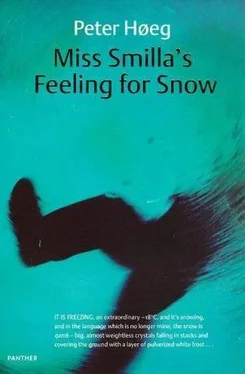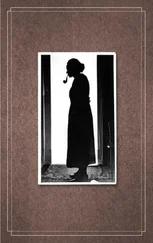Peter Høeg - Smilla's Sense of Snow aka Miss Smilla's Feeling for Snow
Здесь есть возможность читать онлайн «Peter Høeg - Smilla's Sense of Snow aka Miss Smilla's Feeling for Snow» весь текст электронной книги совершенно бесплатно (целиком полную версию без сокращений). В некоторых случаях можно слушать аудио, скачать через торрент в формате fb2 и присутствует краткое содержание. Жанр: Современная проза, на английском языке. Описание произведения, (предисловие) а так же отзывы посетителей доступны на портале библиотеки ЛибКат.
- Название:Smilla's Sense of Snow aka Miss Smilla's Feeling for Snow
- Автор:
- Жанр:
- Год:неизвестен
- ISBN:нет данных
- Рейтинг книги:3 / 5. Голосов: 1
-
Избранное:Добавить в избранное
- Отзывы:
-
Ваша оценка:
- 60
- 1
- 2
- 3
- 4
- 5
Smilla's Sense of Snow aka Miss Smilla's Feeling for Snow: краткое содержание, описание и аннотация
Предлагаем к чтению аннотацию, описание, краткое содержание или предисловие (зависит от того, что написал сам автор книги «Smilla's Sense of Snow aka Miss Smilla's Feeling for Snow»). Если вы не нашли необходимую информацию о книге — напишите в комментариях, мы постараемся отыскать её.
Smilla's Sense of Snow aka Miss Smilla's Feeling for Snow — читать онлайн бесплатно полную книгу (весь текст) целиком
Ниже представлен текст книги, разбитый по страницам. Система сохранения места последней прочитанной страницы, позволяет с удобством читать онлайн бесплатно книгу «Smilla's Sense of Snow aka Miss Smilla's Feeling for Snow», без необходимости каждый раз заново искать на чём Вы остановились. Поставьте закладку, и сможете в любой момент перейти на страницу, на которой закончили чтение.
Интервал:
Закладка:
I have no intention of telling him about Berth 126. "They organize an expedition, under the guise of the corporation, in 1966. Something goes wrong. Maybe there was an accident involving explosives. At any rate, the expedition fails. So they wait twenty-five years. And then try again. But this time something is different. Outside money pays for the transportation. It seems as if they've gotten help and allied themselves with someone. But something goes wrong again. Four men die. One of them is Isaiah's father."
I'm sitting on the mechanic's sofa. Under a woolen blanket. He's standing in the middle of the room, about to open a bottle of champagne. There's something distracting to me about the expensive wine here in this room. He puts it down unopened.
"I talked to Juliane this afternoon," he says.
I noticed at the pastry shop, and afterward on the way home, that something was wrong.
"The Baron was examined every month at the hospital. She got f-fifteen hundred kroner every time. Always the f-first Tuesday of the month. They picked him up. She never went along. The Baron never said anything."
He sits down and stares at the cold bottle. I know what he's thinking. He's considering putting it away again. He has put tall, fragile glasses in front of us. First he washed them in hot water without soap, and then dried them with a clean dishcloth until they were totally transparent. In his big hands they seem as fragile as cellophane.
In Nuuk the waiting list for housing is eleven years. Then you get a closet, a shed, a shack. All money in Greenland is attached to the Danish language and culture. Those who master Danish get the lucrative positions. The others can languish in the filet factories or in unemployment lines. In a culture that has a murder rate comparable to a war zone.
Growing up in Greenland has ruined my relationship to wealth for good. I see that it exists. But I could never strive for it. Or seriously respect it. Or regard it as a goal.
I often feel like a garbage pail. Circumstances have clumped into my life the excesses of a technological culture: differential equations, a fur hat. And now: a bottle of wine cooled to 32°F. Over the years it has gotten harder for me to enjoy it wholeheartedly. If it were all taken away in a flash, I wouldn't mind.
I no longer make an effort to keep Europe or Denmark at a distance. Neither do I plead with them to stay. In some way they are part of my destiny. They come and go in my life. I have given up doing anything about it.
It's night. The last few days have been so long that I've been looking forward to my bed, and to a sleep as all-consuming as in my childhood. In a moment, after merely moistening my lips with the wine, I will get up and leave.
He opens the bottle almost soundlessly. He pours, slowly and carefully, until the glasses are a little more than half full. They are instantly frosted with a matte mist. From invisible irregularities on the inner, curved sides, small beaded rows of bubbles rise to the surface.
He puts his elbows on his knees and gazes into the bubbles. His face is remote, absorbed by the sight and, at that moment, as innocent as a child's. The same way I so often saw Isaiah view the world.
I leave my glass untouched and sit down in front of him on the low table. Our faces are now at the same level. "Peter," I say, "you know the old excuse that she was drunk so she didn't know what she was doing."
He nods.
"That's why I'm doing this before I drink anything." Then I kiss him. I don't know how much time passes. But while it lasts, my whole body is in my mouth.
Then I leave. I could stay, but I don't. It's not because of him or me. It's out of respect for what has taken hold of me, for what hasn't been there for years, for what I don't think I recognize anymore, for what is foreign to me.
It takes me a long time to fall asleep. But that's mostly because I don't have the heart to abandon the night and the silence, and the alert, hypersensitive consciousness that he is lying downstairs, somewhere below me.
When sleep finally comes, I dream that I'm in Siorapaluk. There are several of us children lying on the bed. We've been telling stories, and now the others have fallen asleep. Only my voice is left. I hear it from outside myself, it's trying to keep on going. But at last it staggers, wobbles, falls to its knees, spreads out its arms, and allows itself to be gathered up in a net of dreams.
5
The address of the Trade Commission is Kampmanns Street 1, and it appears well maintained, newly painted, efficient, reliable, helpful, and exclusive without being pretentious.
The man who helps me is a mere boy. He is twenty-three at most, with a double-breasted, custom made suit of thin Harris tweed, a white silk tie, white teeth, and a broad smile.
"Where have I seen you before?" he asks.
The papers have been put in a spiral notebook, the pile is as thick as an illustrated Bible and stamped Annual Report of the Cryolite Corporation of Denmark for Fiscal 1991.
"How can you tell who controls the corporation?" His hands brush mine as he turns the pages.
"It doesn't say directly. But according to corporate law, all shareholdings above 5 percent must be listed on the first page. Was it at a party at the Business School?"
The list is fourteen lines long, with individual and company names mixed together. Ving is there. And the National Bank. And Geoinform.
"Geoinform. Could you show me their annual report?" He sits down at the computer. While we wait for the PC he smiles at me.
"I'll remember where it was," he says. "You didn't study law, did you?"
He has been reading a French newspaper. He follows my gaze.
"I've applied to the foreign service," he says: "So it's important to keep up on things. We don't have anything on Geoinform. It's probably not a public corporation."
"Is it possible to find out who's on the board of directors?"
He gets out a volume as big as two telephone books called Green's Danish Foundations. He looks it up for me. There are three people on Geoinform's board. I write down their names.
"Can I take you to lunch?"
"I have to go for a walk in the Deer Park," I say.
"I could go, too."
I point at his loafers. "There's two feet of snow."
"I could buy a pair of galoshes on the way."
"You're working," I say. "On your way into the diplomatic service."
He nods dejectedly.
"Maybe when the snow melts," he says. "In the spring."
"If we live that long," I say.
I go out to the Deer Park. It snowed in the night. I've taken my kamiks along. Well past the entrance, I put them on. The soles of kamiks cannot stand much wear. When we were kids we were never allowed to dance with them on if there was sand on the floor. You could wear them out in a single night. But on the snow and ice, where the friction is different, their durability is astounding. The new snow is light and cold. I walk as far away from the paths as possible. For an entire day I wade slowly and heavily among black branches glittering with snow. I follow the lurching tracks of a deer until I know its rhythm. The animal's sudden hopscotching every hundred yards, its habit of scattering urine in small portions, a little to the right of its tracks. The regularity with which it scratches an open, heart-shaped area down to the dark earth to find leaves.
After three hours I run into it. A buck. White, wary, interested.
I find an out-of-the-way table at Peter Liep's Restaurant and order hot chocolate. Then I lay out the paper with the three names in front of me:
Katja Claussen
Ralf Seidenfaden
Tørk Hviid
I take out Moritz's envelope with the copies of the newspaper clippings. I'm looking for a specific one.
The room fills up with a group of children and adults. They've parked their skis and sleds outside. Their voices are loud and full of glee. Full of the snow's mysterious warmth.
Читать дальшеИнтервал:
Закладка:
Похожие книги на «Smilla's Sense of Snow aka Miss Smilla's Feeling for Snow»
Представляем Вашему вниманию похожие книги на «Smilla's Sense of Snow aka Miss Smilla's Feeling for Snow» списком для выбора. Мы отобрали схожую по названию и смыслу литературу в надежде предоставить читателям больше вариантов отыскать новые, интересные, ещё непрочитанные произведения.
Обсуждение, отзывы о книге «Smilla's Sense of Snow aka Miss Smilla's Feeling for Snow» и просто собственные мнения читателей. Оставьте ваши комментарии, напишите, что Вы думаете о произведении, его смысле или главных героях. Укажите что конкретно понравилось, а что нет, и почему Вы так считаете.




![Рута Шепетис - Ashes in the Snow [aka Between Shades of Gray]](/books/414915/ruta-shepetis-ashes-in-the-snow-aka-between-shades-thumb.webp)







